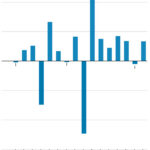For America’s public companies, election day comes every year when common shareholders get to vote on directors, executive compensation and other company issues.
But if you are an investor whose primary exposure to stocks is through mutual funds and retirement accounts, your role in this “shareholder democracy” is likely to be limited. That’s because votes aren’t typically awarded to small investors in mutual funds or exchange-traded funds. Instead, the asset-management company that runs the fund votes, by proxy, on behalf of the investors.
The result is that asset managers wield great power, though investors both large and small are angling to have more of a voice. With that in mind, we answer some commonly asked questions about what your money is doing when it comes to proxy voting.

Who controls public companies?
For the most part, public companies are controlled by the votes of common shareholders and the corporate directors they elect. But asset managers have significant sway. Harvard Law School’s John C. Coates extrapolates this concentration of ownership to “The Problem of Twelve.” In a working paper, he argued that “in the near future roughly twelve individuals will have practical power over the majority of U.S. public companies.” He meant that asset managers like BlackRock Inc., BLK -0.36% Vanguard Group and Fidelity Investments—primarily investing on behalf of retirement investors and savers—would essentially serve as a 12-headed corporate board, lording over all public companies.
Who Holds the Keys
Percentage of listed equity held in the U.S., by investor categories

Institutional investors
Other free-float
Strategic individuals
Public sector
Private corporations

Institutional investors
Other free-float
Strategic individuals
Public sector
Private corporations
How do asset managers tend to vote?
For years, asset managers were criticized for too often supporting the status quo at public companies, meaning they consistently voted their shares in line with management. (Shareholders can vote “for,” “against” or “abstain” on their ballots.) But over the past few years, asset managers have kicked their fiduciary duty into high gear—supporting shareholder proposals and dissident directors, and opposing mergers. Their positions on hot-button issues such as climate change, diversity and board composition also have gotten more pointed, culminating in last summer’s election of directors to the Exxon Mobil XOM 0.82% board who were nominated by upstart hedge fund Engine No. 1. With a relatively small holding, but an extensive analysis on Exxon’s position in the market, Engine No. 1 was able to convince the company’s largest shareholders to back three of its four director nominees

Might asset managers ever cede control of their votes?
Perhaps slowly, as asset managers weather the criticism about their voting power. Starting this year, BlackRock is giving more of its institutional clients, such as pensions and endowments, the option to vote themselves. BlackRock called the change the “first in a series of steps to expand the opportunity for clients to participate in proxy voting decisions where legally and operationally viable.”

Haven’t large investors always had a say?
For years, some large clients of index managers such as BlackRock, State Street Corp.’s STT 2.77% State Street Global Advisors and Vanguard have retained their proxy-voting rights, and of course individual shareholders and institutional investors that manage their own money retain say over their votes. BlackRock’s change this year extends that right to roughly 40% of its $4.8 trillion indexed-equity assets in the U.S. and U.K., including $750 billion in institutional pool funds such as those that might be held in retirement plans. This shift was made amid the rise of ETFs (including those offered by BlackRock) that focus more on environmental, social and governance (ESG) factors in investing. In addition, after its victory in the Exxon Mobil proxy contest, hedge fund Engine No. 1 launched an ETF with the ticker symbol VOTE, aiming to give smaller investors a say in what S&P 500 companies do by promising to take a more critical view on management and shareholder proposals related to ESG matters. “For years, the typical S&P 500 fund voted against 80% or 90% of social and environmental shareholder proposals,” said Yasmin Dahya Bilger, managing director and head of ETFs at Engine No. 1. “For many investors, that’s not good enough.”

How do I find out how my fund voted?
While some asset managers have begun to communicate their votes on proxy contests in advance, the largest of the bunch still play their cards close to the vest.
More in ‘Need to Know’
Since 2003, fund managers have made annual filings of Form N-PX with the Securities and Exchange Commission, detailing how shares were voted and whether they voted for or against management recommendations. That means investors often have to wait for those filings to find out how their funds voted. In September, the SEC proposed additional rules on proxy-voting disclosure by fund managers and other large holders, including standardization of voting categories (board of directors, extraordinary transactions, say on pay, etc.) and a requirement that reports be machine-readable, allowing for better comparability across funds. The SEC followed that in November by adopting a universal proxy rule for contested elections that would, among other things, reduce costs and simplify vote tallies, making it easier to propose dissident directors.

Who else could influence voting decisions?
If a new voice were to emerge in proxy voting, it could be retirement-plan participants, particularly those whose corporate plans access stocks through separate accounts or commingled trusts. “Even the pension funds are facing growing calls from their own members—teachers, firefighters, police, construction workers—to exercise more of their shareholder voice,” says David Webber, a law professor at Boston University and author of “The Rise of the Working Class Shareholder.” He adds, “It’s not just a top-down story. There’s bottom-up pressure as well.”

Could everyday investors eventually get a say?
Even if they aren’t polling for opinions on every hot topic or contested vote, mutual-fund companies have picked up on the shift in awareness and have become more transparent about their voting policies and expectations for companies. “I think we’re going to see an expansion of what it means to be a fiduciary as a forward-thinking asset manager,” says Alex Lebow, co-founder and chief executive of Say Technologies, an investor-engagement company recently bought by Robinhood Markets Inc. HOOD 1.99% While Say initially focused on bringing individual-investor questions to corporate-earnings calls, Mr. Lebow says that the company also could help asset-management firms and individual mutual funds reach out to their own shareholders regarding proxy-voting direction.
Glossary
Fiduciary: Portfolio managers, investing in stocks on behalf of mutual-fund and ETF shareholders and others, are expected to act in the best interest of their clients, including when it comes to how they vote on corporate issues.
Proxy contest: When a shareholder or group of shareholders take voting on certain corporate actions (director nominees, mergers) directly to all shareholders without the support of the company or its board.
ESG: Environmental, social, and governance shareholder proposals (climate-change disclosure, racial equity, human rights) are increasing and gaining support from more shareholders of U.S.-listed companies.
Stewardship: When asset managers take on responsibility to engage companies and vote proxies on behalf of fund shareholders, pooled investment vehicles and separately managed accounts.
Mr. Weinberg is a writer in Connecticut. He can be reached at [email protected].
Copyright ©2022 Dow Jones & Company, Inc. All Rights Reserved. 87990cbe856818d5eddac44c7b1cdeb8








